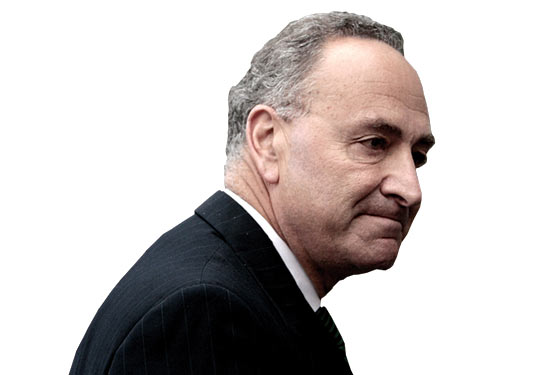
Chuck Schumer has a problem. Sure, he’s a victim of his share of the anti-incumbent hostility that is defining this year’s races, and his Marist poll numbers last week showed the job approval for New York’s senior senator falling below 50 percent for the first time in nine years. But considering that Schumer has more than $19 million in the bank, no serious opponent, and a relentless schedule traveling the state, even Al D’Amato, whom he beat back in 1998, is unwilling to predict an upset. “Senator Schumer knows how to run a campaign,” he says. “I think he will be New York’s next three-term senator.” And two days after Marist’s came a Quinnipiac poll showing Schumer with a 58 percent job approval.
Besides, those polls were measuring the sentiments of mere random citizens. Schumer’s real problem is with some of his wealthiest and most powerful constituents. After pouring millions of dollars into Schumer’s personal campaign coffers during the past two decades, and contributing generously to his 2006 drive to elect a Democratic Senate majority, a sizable number of New York business leaders are complaining that they aren’t getting their money’s worth, especially as populist anger at Wall Street has soared and the White House has pushed to regulate the financial industry. Weary of being demonized, they’re taking some of their frustration out on Schumer, claiming he has switched sides: He supported the original bailout, but lately he’s been unnervingly quiet on the proposed “Volcker Rule” that would try to clamp down on proprietary trading. “Chuck says, ‘I’ve been there to help you,’ ” says a lobbyist for a major New York financial firm. “Well, that’s when we were playing stickball. Now we’re in a cage match and he’s hiding under his desk.”
New York politicians, meanwhile, were angered by federal health-care proposals that could have cost the city and state billions in Medicaid money, and accuse Schumer of being more concerned with nursing his majority-leader ambitions than protecting local budgets. But because Schumer isn’t electorally vulnerable, the aggrieved have had to find other means to send their message and to shift some of the heat they’re taking. In November, some of New York’s biggest CEOs—including Goldman Sachs’ Lloyd Blankfein, JPMorgan Chase’s Jamie Dimon, Pfizer’s Jeff Kindler, and News Corp.’s Rupert Murdoch—met with Schumer in Manhattan to express their dissatisfaction. “But it’s the public things that get Chuck’s attention,” a Democratic strategist says. So in mid-December, Mayor Bloomberg and Governor Paterson issued a public letter, ostensibly addressed to both of New York’s senators, ripping the emerging health-care bill.
There have been minor shots, like the “Page Six” item ridiculing the low sales of Schumer’s 2007 book. But by far the most intriguing gambit has been the quasi campaign of Harold Ford Jr. against Kirsten Gillibrand, the junior senator who has been a virtual ward of Schumer’s. “A lot of what’s fueling the Ford thing is Chuck’s donors, who are furious at him,” a well-connected political consultant says. “They feel he’s walked away from them. He’s become a more partisan Democratic figure than he ever was. In part, it’s a deliberate decision he made to get a bigger profile in Washington, to position himself to be the majority leader if Harry Reid loses in November. But it’s come with some cost in New York.”
Have good intel? Send tips to intel@nymag.com.